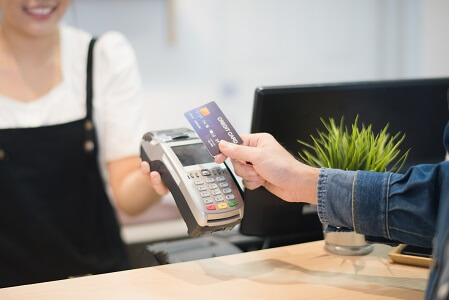Understanding the Shift in Consumer Behavior
In a dynamic, technologically driven world, companies in every industry are developing and embracing new products to differentiate their customer experience and maintain business continuity. The retail industry is no different: Consumers have used technology in new ways to adapt to unexpected and complex circumstances, and they expect the brands they buy from to do the same.
A few of the biggest recent disruptors to physical retail environments have been ecommerce and the transition to working from home. In summer 2021, WD Partners surveyed thousands of US consumers and found the majority of them had worked from home at some point. While most respondents projected they’d continue working from home for at least part of the work week, zero percent expect to go back to an office five days a week. Executive Vice President of Thought Leadership and Marketing at WD Partners, Lee Peterson, said the impact of this “is far-reaching.”
Additionally, 68% of respondents said ecommerce is their preferred method of shopping going forward — up from 52% in 2020 and ~30% in 2019. Consumers are thinking differently now, likely because they are in a different place, Peterson notes.
Adapting the Retail Technology Experience
With the availability and convenience of 24/7 online shopping, next-day delivery and curbside pickup options, roughly 72% of retailers’ customer interactions have gone digital. However, despite this heavy push for digital shopping experiences, brick-and-mortar shopping still holds plenty of value, too. Companies that revitalize the in-person shopping experience by marrying digital and physical through tech-savvy digital tools and partnerships are better prepared to deliver an “unprecedented customer experience” that keeps customers coming back for more.
Digital tools have become an integral part of the in-store experience, and companies without the right systems, operations and processes in place are more likely to find themselves at a disadvantage. The hybrid shopping model, which integrates the physical and digital worlds, is quickly emerging as the retail industry’s next step in meeting shoppers’ demands for retail service and convenience.
Considering these consumer expectations and the major work-from-home transition, retailers must lead with purpose in empowering both consumers and employees by providing a convenient and seamless retail experience — using technology as a differentiator.
Managing Your Retail Technology with a Service Partner
While technology can help you meet consumer demands and address the challenges of “always-on” shopping, navigating the additional needs and complexities that come with technology can be a challenge in itself, taking away attention and resources from driving your core business, or even disrupting the customer experience.
Fortunately, outsourcing retail technology services alleviates the strain of managing and maintaining the retail technology solutions that help keep your business alive and thriving. Additionally, outsourcing these services to a trusted partner helps you:
- Provide a seamless experience for both customers and employees
- Focus more on innovation and delivering unmatched customer satisfaction
- Achieve greater predictability in store operations
- Maximize the benefits of your technology solutions
- Maintain peace of mind that your in-store technology will persevere during even the busiest shopping season
However, not just any service provider will do. Partnering with the right provider is critical to ensuring you, your customers and your employees are getting the most out of your retail technology investments.
In this three-part series, use these checkpoints to determine what to look for when evaluating potential retail technology service partners.
 Multi-Vendor Environments
Multi-Vendor Environments
When it comes to retail technology, the options are nearly infinite. Your point-of-sale systems may be from one manufacturer, your ecommerce platform through another company and your digital signage from yet another manufacturer. Managing all these different types of technologies can be a full-time job itself, but leveraging a brand-agnostic partner who can service all these different hardware solutions — regardless of vendor — can help keep your store operations running as expected.
 Optimized Operations
Optimized Operations
The right retail technology service partner goes beyond the bare minimum. In addition to keeping you up and running, they should also use historical data and real-world experience to help you:
- Develop strategies for cost savings
- Reduce downtime and optimize store support
- Implement targeted solutions aligned to your unique challenges and needs
A partner who works with you to optimize operations can be invaluable in helping to enhance both predictability and your competitive advantage as the market evolves.
 Single Source Service Partner
Single Source Service Partner
Every piece of technology you bring into your retail store experience goes through a similar lifecycle. You must first procure the technology, then install and implement it, then maintain it and finally, repair and/or dispose of it as it approaches end of life.
Leveraging partners for services like these helps reduce complexity, but finding a single partner who can handle all of these services — and more — is even better. Relying on one source with end-to-end retail technology services via a single contact means better accountability, consistency and overall management.
How Does Your Retail Technology Service Provider Check Out?
A retail technology service provider should add value at every step of the product lifecycle. If they don’t have the end-to-end service capabilities to manage multi-vendor environments with different technology brands, then you will likely be required to endure an unnecessary level of complexity in managing multiple products and partners. And you may be missing out on cost savings and operational optimization opportunities, too.
Instead, consider a single technology service partner with deep expertise who can manage your end-to-end retail technology lifecycle for all the devices you use to keep business running smoothly.
Download the “Retail Technology Services Checkup” eBook for the full checklist of all nine checkpoints to determine if it’s time to think about a new retail technology service partner.
In part two, learn more about complete lifecycle management, increased uptime and experience and flexibility when evaluating potential retail technology services partners.
About the Author
 Teri Glover joined Shyft Global Services in March 2021 via the outsourcing agreement with Fujitsu America, Inc. and serves as the Director of Global Client Success and Service Delivery Management. She holds over two decades of experience in services and is relentlessly dedicated to delivering the highest-quality customer experience possible, especially in the retail technology space.
Teri Glover joined Shyft Global Services in March 2021 via the outsourcing agreement with Fujitsu America, Inc. and serves as the Director of Global Client Success and Service Delivery Management. She holds over two decades of experience in services and is relentlessly dedicated to delivering the highest-quality customer experience possible, especially in the retail technology space.





-1.jpg?width=1200&height=801&name=End-of-life%20support%20(1)-1.jpg)